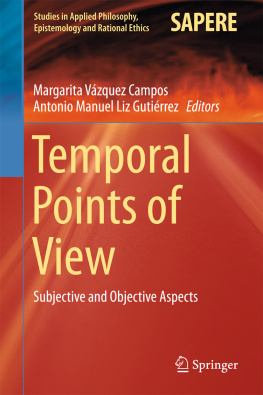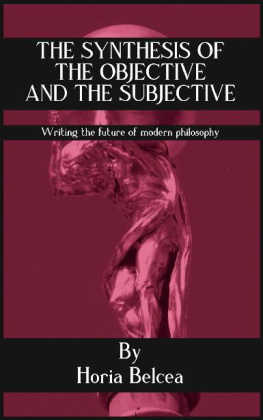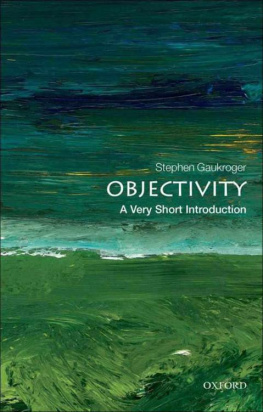We cannot have access to reality, and to ourselves, except by adopting a point of view. In fact, the notion of point of view is crucial in many contexts and discourses. But, what is a point of view? Even though there are some classical antecedents for a philosophical treatment of the notion of point of view, and in spite of its great importance, there is a deep lacuna about what can the structure of points of view be, and about what can their nature and mode of existence be. In this work, we present two general approaches in order to analyse the structure of points of view. One of them takes propositional attitudes as a model. The other focusses on the notions of location and access. To some extent, the structure of points of view can be analysed without engaging with the difficult issue of the peculiar nature and mode of existence of points of view. But we also face these questions. We argue that points of view are essentially relational entities with quite a strong modal character. This will entail that points of view are not reducible either to subjectivity, or to information, or to current physics.
There are many things that are said to be relative to a point of view or perspective (we will take these notions as equivalent). We say, for instance, that beauty is in the eye of the beholder; or that there are many different moral and cultural perspectives; or that we can adopt distinct conceptual frameworks with respect to a given issue. What is known, thought, said, intended, etc., is very often relativized to a point of view. Even the whole of reality is sometimes so relativized.
The ordinary notion of point of view is highly ambiguous. There is a first ambiguity about what is the crucial element of a point of view. Sometimes the emphasis is placed on the bearer of the point of view. Other times, the emphasis is on the location or emplacement from which the point of view is adopted. There is a second ambiguity about what are the effects, or powers, that points of view can provide. Sometimes, points of view are understood as having a very strong constitutive power over things like content, truth, knowledge, etc. Other times, they are understood as having a much weaker power regarding exactly the same things.
Beyond the ordinary usage, the notion of points of view is relevant in many fields, from fine arts to science, and all these fields are full of very suggestive insights. However, and in spite of being so important a notion, the lack of deep philosophical theories or even tentative analyses about points of view is remarkable. Points of view have rarely become a subject of philosophical attention.
1.1 Points of View in Ordinary Language
We speak of an engaged point of view, of a scientific point of view, of a logical point of view, etc. Also, we contrast the point of view of self-interest with the point of view of morality, or with the point of view of society. We can take a large perspective, or a narrow one. We can take the point of view of the man in the street, or a religious point of view. We can even take a transcendental point of view.
In that variety of uses, the notion of point of view may have two distinct meanings. In one of them, points of view are part of a mental life. They are connected to the mental life of some subjects with a personal character. In that sense, the expression point of view is interchangeable with words like view, opinion, belief, attitude, feeling, sentiment, thought, etc. Points of view in that sense could not exist without a subject with quite a rich mental life.
There is another quite important meaning in the ordinary notion of point of view. In that second sense, points of view could exist without any actual subject exemplifying them. Here, points of view explicitly have a strong relational and modal, specially subjunctive, character. Points of view offer possibilities of having access to the world. They offer possibilities of seeing things (hearing them, touching them, etc.), possibilities of thinking about them (considering them, imagining them, etc.), and possibilities of valuing them (assessing them, pondering them, etc.). Moreover, points of view offer possibilities of seeing, thinking about and valuing our own process of seeing, thinking and valuing any other thing.
It is in that second sense that we use expressions like The point of view of politics, The point of view of science, A utilitarian point of view, etc. In that sense, we also say things like The point of view you can get from the top of that mountain is really wonderful. In all these cases, we presuppose that there are possible perspectives that are objectively there. We talk about the points of view offered by telescopes and microscopes, or about the point of view of a book, of a picture or, in general, of any work of art. Here, the expression point of view is interchangeable with words like viewpoint, standpoint, position, outlook, etc.
Many times, the ordinary notion of point of view is ambiguous in relation to the above two meanings. Moreover, as we will see, the philosophical approaches to the structure of points of view also can be distinguished according to whether they place the emphasis on the first meaning or on the second one.
There is another very important ambiguity in the ordinary notion of point of view, this time having to do with the sort of effects, or powers, that points of view can provide. Sometimes, points of view are understood as having a strong constitutive power over things like content, truth or knowledge. This has been an important source of scepticism. Also, it is the main idea underlying the connections between points of view and relativism. In that sense, to say, p , from my point of view would entail a kind of redundancy. Every content p has to be the content of some point of view. Moreover, for relativism there could not be any content (any truth, any knowledge) that is not determined, or construed, or shaped, by a point of view. Here, the constitutive power of points of view is extreme. Other times, however, points of view are interpreted in the opposite way: as weakening our attachment with a certain content, truth or knowledge. In this second sense, to say, p , from my point of view would not be redundant. It would express that my propositional attitude towards p is less engaged with the truth than if I were to believe that p in a strict sense, and of course much less engaged with the truth than if I were to know that p . In that second sense, when I say, p , from my point of view, it is even questionable that p is the real content of some of my beliefs.










